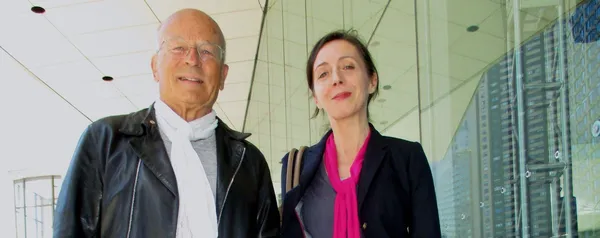At the 2014 Telluride Film Festival, Volker Schlöndorff was awarded the Silver Medallion and Diplomacy (Diplomatie), starring Niels Arestrup and André Dussollier was screened, as well as Billy, How Did You Do It? (Billy Wilder, Wie Haben Sie's Gemacht?) and Baal starring Rainer Werner Fassbinder. In New York, we discussed his adaptations from The Tin Drum by Günter Grass to Cyril Gely's play Diplomatie and dubbing Dustin Hoffman in German with Otto Sander in Arthur Miller's Death Of A Salesman. Working with Sam Shepard on Voyager, Arestrup's correspondence with Philip Seymour Hoffman in Anton Corbijn's A Most Wanted Man, Bertrand Tavernier's The French Minister and Ralph Fiennes' Max Frisch desires are explored.
Anne-Katrin Titze: As far as adaptations are concerned, you've done it all - from the biggest novel [The Tin Drum] to a not well-known play [Diplomatie]. Billy Wilder, in the interviews you did with him gave the advice to always go for the play.
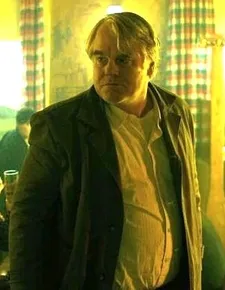 |
| Philip Seymour Hoffman as Günther Bachmann in A Most Wanted Man: "I was very impressed by this movie." |
Volker Schlöndorff: Yes, absolutely. He told me early on, before even The Tin Drum, he told me, don't do novels. It's too complicated to find the dramatic structure in a novel. Whereas in a play, even a totally irrelevant Austro-Hungarian play, you can always take the plot line and the construction and turn it into anything. Like [Billy Wilder's] One, Two, Three was based on a Budapest play. So I listened to his advice and then I told him that I was going to do the Tin Drum.
AKT: The most impossible novel. You listened well.
VS: We had a strong friendship. Michael Barker [Sony Pictures Classics co-president] who did a Q&A and a long conversation with me in Telluride told me that Wilder had told him that he had - I hardly dare say it - similar regrets. I regretted all my life that I made these heavy movies when all I really wanted to do was comedies. And Billy Wilder told Michael Barker, look, he [Schlöndorff] is really doing the important things that I wouldn't dare to touch.
AKT: With Diplomacy you are again going for the heavy stuff. You are asking the audience to confront questions of responsibility, big moral questions.
VS: Yes, but I hope I am entertaining them as well. It was important that it's like a thriller. I discussed it this morning with a painter, no less than Alex Katz. I told him, that I felt like a Swiss clockmaker working on this movie because it's all in the mechanics. We know the outcome, so it's all in the precision of it. And he said, well, sometimes, I do a painting where I feel like a cabinetmaker. It just has to work on its own terms. It's all in the craftsmanship.
AKT: When you have several languages, there's always a problem in how to best deal with it. Recently, I spoke with Anton Corbijn about this point for A Most Wanted Man.
VS: Oh, yes. I like his films very much. I don't know him personally but I was very impressed by this movie. I saw it this summer out there in the Hamptons.
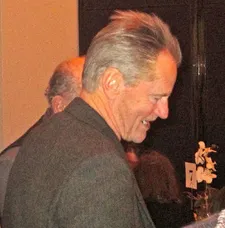 |
| On Sam Shepard and Voyager: "He read the screenplay and he said, you can't do that." Photo: Anne-Katrin Titze |
AKT: Anton said that he very much dislikes when characters speak another language at the start and then miraculously switch to English. It's a difficult decision. So he had Philip Seymour Hoffman speak English with a German accent. You chose another direction.
VS: Actually, I always compared Niels Arestrup to Philip Seymour Hoffman. The only other actor who had this quality was really Seymour Hoffman. I saw him two years ago on stage in Death Of A Salesman. A play I know every line by heart and every movement and every blocking.
AKT: Of course, because you filmed it with Dustin Hoffman.
VS: And I was totally fascinated by his [Seymour Hoffman's] performance which was unlike anything I've ever seen. You literally saw a person on stage slowly disintegrating without seemingly doing anything. This is beyond acting. And I think what Niels Arestrup did to this German General is very much of that same quality. That's why when they asked me to cast the German, if he were to at least phonetically to learn the German, then there is no better one than him to do this part.
AKT: He is very good and so different from the part he has in Bertrand Tavernier's Quai D'Orsay,The French Minister, which is also about diplomacy.
VS: I went to see him one day when they were shooting Quai D'Orsay. That was at the very beginning, I was still prepping. I didn't see him on stage in the play Diplomatie. It was A Prophet, where he [Arestrup] plays this mafia gangster boss in Jacques Audiard's film, that's where he most impressed me.
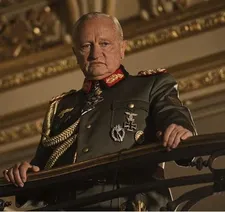 |
| Niels Arestrup as General Dietrich von Choltitz in Diplomacy: "During rehearsal you sometimes find the right moment and then you work hard to find this moment again." |
AKT: To combine him with André Dussollier - what an unlikely combination. They were doing the play together on stage in Paris?
VS: Yes they were. It was a great help that they had done the play. They knew all the nuances of their characters. On the other hand, they were both scared that because of the routine they had, they could not find again the truthfulness of the first time which the camera picks up on. Anything that is stale or like a reproduction or a copy the camera detects immediately.
During rehearsal you sometimes find the right moment and then you work hard to find this moment again. But how to find this moment again when you have done 300 performances? It was very demanding for both of them. I knew we had to re-invent every single moment.
AKT: Heinrich von Kleist's On the Marionette Theatre. You have to go all the way to find the lost grace.
VS: In theater you have to reproduce. In Salesman, I wanted it to look like theater with this artificial set built in the Astoria Studios in New York. This time, I felt it was very important that the room and the furniture, the textiles and everything feel very real. And Paris outside had to be like a third character. Very real to live up to the [documentary footage] images of Warsaw. When you start like that it's a hard act to follow.
AKT: When I spoke with Sam Shepard, he told me that when the Berlin Wall came down he was in the middle of filming Homo Faber (Voyager) with you.
VS: Oh, my God. Did he mention that?
AKT: He did.
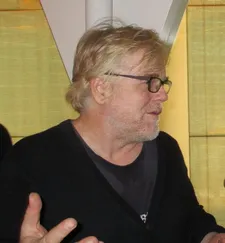 |
| On Philip Seymour Hoffman in Death of a Salesman: "You literally saw a person on stage slowly disintegrating without seemingly doing anything." Photo: Anne-Katrin Titze |
VS: It's a strange thing. It's one of my favorite films. And after The Tin Drum, my most successful one in Germany. It never took on here at all. And Sam called my agent at the time. He knew it from the beginning. He read the screenplay and he said, you can't do that. The cultural gap is too wide. This idea of Greek tragedy, of guilt and destiny befalling a man without his fault, just because the gods strike blindly - that is simply not in the American mentality. I had the feeling that after the movie, Sam Shepard was kind of divorced from it. Actually, he wrote a volume of short stories where in a quite direct way, he was belittling this whole experience of this movie.
AKT: What he mentioned to me was the horrible English title that didn't do it justice.
VS: That was my fault because we couldn't come up with anything better. They didn't want Homo Faber, understandably. Of course, I thought of Now, Voyager [ the 1942 Bette Davis/ Paul Henreid movie]. We could have called it now, Voyager, Now.
AKT: Otto Sander did the German voice for Dustin Hoffman [Willy Loman] in your Death Of A Salesman, correct?
VS: Yes. It was a real star cast. Actually, I rehearsed the play in German before going into the studio. With Otto Sander and Heiner Lauterbach, Rolf Zacher, Doris Schade for the mother, and we actually rehearsed the play. I became aware that the German translation was so bad that I re-translated the play. Ever since, when the play is done in Germany, my translation is being used.
AKT: Did you consult with Arthur Miller?
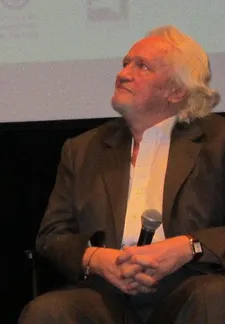 |
| On the diplomacy of Bertrand Tavernier's The French Minister with Niels Arestrup: "I went to see him one day when they were shooting Quai d'Orsay." Photo: Anne-Katrin Titze |
VS: Not on the translation but on the making of the movie.
AKT: You are working on a Montauk project. Over the summer, I re-read Max Frisch's novella. It really holds up well. Is your film project a version of it?
VS: It's only inspired by it. It has nothing to do with Max Frisch, except that it's a writer coming to New York to launch his last novel and finds out that his wife, who came earlier to deal with the translation, had an affair with someone in town. That gives him an excuse to escape to Montauk with an old flame - not with a young publicist [as is the case in Frisch's book].
Little by little, the two of them find out that they have been 20 years ago the love of their lives and, it turns out later, the one they always regretted. But during their weekend in Montauk it turns out that that's not enough to start anew. You can't start anew. I wrote it with Colm Toibin, an Irish writer who contributed a lot to The New Yorker. He had a play on Broadway last year, The Testament Of Mary.
AKT: It is an original screenplay?
VS: It's an original screenplay. When they talk about their lives it's not Max Frisch's life - its their lives, basically the lives of Colm Toibin and myself. It is really hardcore arthouse. Ralph Fiennes wanted to do it. Actually, he's very adamant about doing it. He wanted to do it in October, now, but I couldn't find any money so far. I don't know what's going to happen with this film.
Coming up - Volker Schlöndorff talks Diplomacy with Niels Arestrup as his German General Dietrich von Choltitz and André Dussollier as Swedish consul-general Raoul Nordling.











